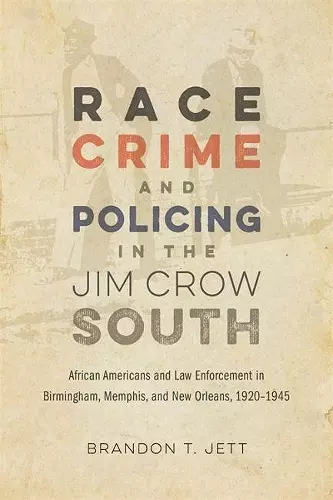Race, Crime, and Policing in the Jim Crow South
African Americans and Law Enforcement in Birmingham, Memphis, and New Orleans, 1920-1945
Format:Hardback
Publisher:Louisiana State University Press
Published:7th Jul '21
Currently unavailable, and unfortunately no date known when it will be back

Throughout the Jim Crow era, southern police departments played a vital role in the maintenance of white supremacy. Police targeted African Americans through an array of actions, including violent interactions, unjust arrests, and the enforcement of segregation laws and customs. Scholars have devoted much attention to law enforcement's use of aggression and brutality as a means of maintaining African American subordination. While these interpretations are vital to the broader understanding of police and minority relations, Black citizens have often come off as powerless in their encounters with law enforcement. Brandon T. Jett's Race, Crime, and Policing in the Jim Crow South, by contrast, reveals previously unrecognized efforts by African Americans to use, manage, and exploit policing. In the process, Jett exposes a much more complex relationship, suggesting that while violence or the threat of violence shaped police and minority relations, it did not define all interactions.
Black residents of southern cities repeatedly complained about violent policing strategies and law enforcement's seeming lack of interest in crimes committed against African Americans. These criticisms notwithstanding, Blacks also voiced a desire for the police to become more involved in their communities to reduce the seemingly intractable problem of crime, much of which resulted from racial discrimination and other structural factors related to Jim Crow. Although the actions of the police were problematic, African Americans nonetheless believed that law enforcement could play a role in reducing crime in their communities. During the first half of the twentieth century, Black citizens repeatedly demanded better policing and engaged in behaviors designed to extract services from law enforcement officers in Black neighborhoods as part of a broader strategy to make their communities safer.
By examining the myriad ways in which African Americans influenced the police to serve the interests of the Black community, Jett adds a new layer to our understanding of race relations in the urban South in the Jim Crow era and contributes to current debates around the relationship between the police and minorities in the United States.
Brandon Jett shatters some widely held axioms about policing in the American South, showing how police departments emerged in lockstep with urbanization – not slavery – and evolved in complex ways, from mechanisms of racial control to entities that relied on Black cooperation and consent. Jett's book should be required reading for anyone interested in the complex story of race and policing in the United States. From the dustiest corners of law enforcement archives, Brandon Jett has unearthed the chilling history of southern white police departments that even in the middle of the 20th Century ruthlessly pursued the enforcement of degrading racial expectations, aiding the exploitation of African-American labor, and unjustly brutalizing and intimidating black citizens away from their civil, political and legal rights. This is the foundational story of why the Black Lives Matter movement is not just necessary but long overdue. With depth and nuance, Brandon Jett examines the rise of professional police departments in three southern cities in the midst of the Jim Crow Era. He shows how law enforcement served to reinforce white supremacy, how African Americans responded to the often brutal over policing of their neighborhoods, and how they negotiated the policing system to ensure the safety of their communities. This is a remarkably intelligent and well-researched book that will contribute much to our understandings of the history of criminal justice in the South and urban life under Jim Crow. Race, Crime, and Policing in the Jim Crow South will have an immediate impact on the understanding of race and policing in America. Brandon Jett vividly illustrates the continuous maltreatment of blacks by the criminal justice system and how African Americans responded in myriad, and at times unexpected, ways to the expansion of that system. This is important work.
ISBN: 9780807175071
Dimensions: unknown
Weight: 500g
256 pages